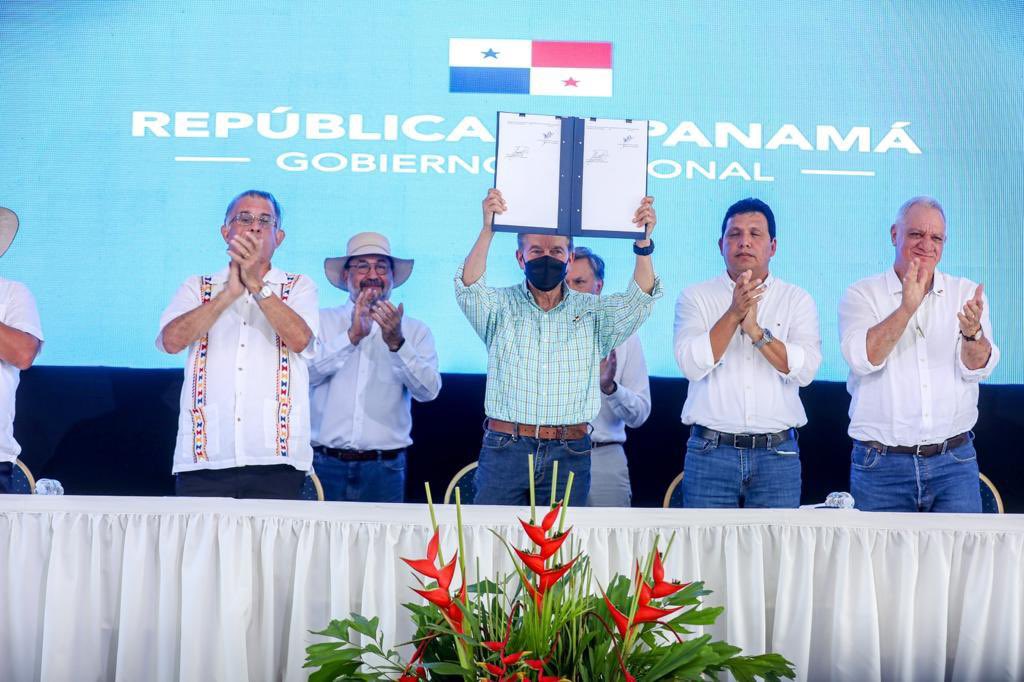Panama, January 2023 – Panama’s State Agrifood Policy Law, which was designed to ensure the human right to food and protect the productive sector, came into force on January 18, 2023.

President Laurentino Cortizo Cohen sanctioned the law at a ceremony attended by hundreds of farmers from different regions of Panama and with the special guest of Manuel Otero, Director General of the Inter-American Institute for Cooperation on Agriculture (IICA). Also present was Dr. Arnulfo Gutiérrez, Director General of Panama’s Institute for Agricultural Innovation (IDIAP) and President of FONTAGRO.
The law, the first of its kind in the region, is the result of a two-year discussion process with Panama’s public and private sectors. It seeks to create the conditions for all the country’s inhabitants to have access at all times to healthy and nutritious food at affordable prices. In addition, it favors the competitiveness of agriculture, focusing on the economic, social and environmental sustainability of food production and the well-being of rural inhabitants.
“We cannot privilege food imports as we did in the past. When needed, we can agree on what products to buy abroad to complement domestic production, but we will not import food when our producers are harvesting,” said the Panamanian president, adding that this law is an example for other countries to follow.
In the future, a portfolio of investment projects for more than US$1.2 billion over the next ten years is foreseen, with the focus on the technological transformation of agriculture and the affirmation of its role as the engine of Panama’s economic and social development.
According to the law, the Ministry of Agricultural Development, in coordination with the Ministry of Economy and Finance, will be in charge of building the National Development Plan for the Agricultural and Rural Sector. Some of the objectives to be included in the Plan are the improvement of the living conditions of rural inhabitants, the promotion of competitiveness, the efficient management of rural territories and the promotion of the application of measures to mitigate and adapt to climate change.
It also emphasizes the importance of strengthening agricultural policy with the incorporation of science and technology to address the effects of climate change, something that the country has been working on hand in hand through IDIAP in projects with FONTAGRO.
An example of this is the ‘Protected Horticulture’ project, which seeks to contribute to improving the competitiveness of family farming horticultural systems through technological innovations for the intensification and sustainable diversification of production under protected conditions, in view of the vulnerability of working in open fields under adverse environmental conditions. And similarly, the project for scaling up the production of bean seed biofortified with iron, and the warning systems against potato diseases, to name a few.
“For us it is very important that research and technology will be considered as one of the pillars. That is what we are working on at IDIAP with all our team,” said Dr. Gutiérrez.
***
About FONTAGRO
FONTAGRO was created 1998 with the purpose of promoting the increase of the competitiveness of the agri-food sector, ensuring the sustainable management of natural resources and the reduction of poverty in the region. The objective of FONTAGRO is to establish itself as a sustainable financing mechanism for the development of agricultural technology and innovation in Latin America and the Caribbean and Spain, and to establish a forum for the discussion of priority topics of technological innovation. The member countries are: Argentina, Bolivia, Chile, Colombia, Costa Rica, Ecuador, Spain, Honduras, Nicaragua, Panama, Paraguay, Peru, Dominican Republic, Uruguay and Venezuela. In the last 21 years 167 regional agricultural innovation platforms have been co-financed for an amount of US $ 124 million, which has reached 452 institutions and 33 countries worldwide.
